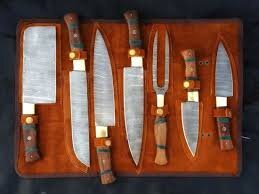A Damascus knife is a prized possession known for its sharpness, durability, and beautiful patterns. Proper storage is essential to maintain its longevity and performance. Without proper care, the blade may develop rust or lose its sharp edge. Here’s a guide on how to store your knife store properly to keep it in the best condition for years.
Storing a Damascus knife properly is essential for maintaining its beauty, sharpness, and durability. By following these simple steps—keeping it dry, using a sheath or block, storing in a dry environment, applying oil, and performing regular maintenance—you can ensure your knife remains in excellent condition for years. Proper care not only enhances the lifespan of the knife but also keeps it performing at its best for all your kitchen needs.
Clean the Knife Before Storage
Before storing your Damascus knife, ensure it is thoroughly cleaned. Wash the blade with mild soap and warm water to remove any food particles or residue. Avoid harsh detergents as they can damage the steel. After washing, dry the damascus knives completely with a soft cloth. Any moisture left on the blade can lead to rust formation. Additionally, avoid soaking the knife in water, as this can weaken the material. Proper cleaning ensures that your knife remains free from corrosion and maintains its sharpness for longer use.
Keep the Blade Dry at All Times
Moisture is the biggest enemy of a Damascus knife. Always store your knife in a dry place to prevent rust and oxidation. After cleaning, use a dry cloth to wipe away any remaining moisture from the blade. If you live in a humid environment, consider using silica gel packets in your storage area to absorb excess moisture. A well-ventilated storage space can also help prevent rust. Additionally, avoid leaving your knife in the sink or dishwasher, as prolonged exposure to water can damage the blade. Keeping the knife dry is essential for maintaining its quality and durability.
Use a Knife Sheath or Blade Guard
A sheath or blade guard is one of the best ways to protect a Damascus knife. It prevents the blade from coming into contact with other objects that might cause scratches or dull the edge. Leather and wooden sheaths are great options, as they offer excellent protection while keeping the knife secure. Plastic or silicone guards also work well, especially if you need to store multiple knives together. Always ensure that the sheath is clean and dry before placing the knife inside. Proper blade protection helps in preserving the sharpness and intricate patterns of a Damascus knife.
Store in a Knife Block or Magnetic Strip
A knife block or magnetic strip is a convenient way to store a Damascus knife safely. A wooden knife block keeps the blade covered and protected from external elements. Ensure the slots are clean and dry to prevent bacteria buildup. A magnetic strip, on the other hand, keeps the knife in plain sight while preventing it from rubbing against other utensils. If using a magnetic strip, ensure it is strong enough to hold the knife securely. Storing knives in drawers without protection can cause damage, so always use a block or strip for better organization and safety.
Avoid Storing in a Humid Environment
Humidity can cause Damascus knives to rust quickly. Avoid storing your knife in places like the kitchen sink area, dishwasher, or near windows where moisture levels fluctuate. Instead, keep your knife in a cool, dry place, preferably in a cabinet or drawer with proper air circulation. If possible, use a dehumidifier in your kitchen or storage area to maintain low humidity levels. Humidity control is crucial for maintaining the longevity of your Damascus knife, ensuring it remains rust-free and in excellent condition for daily use.
Apply a Light Coat of Oil
Applying a thin layer of oil to the blade helps protect it from rust and oxidation. Food-safe mineral oil or camellia oil works well for Damascus steel. Use a soft cloth to apply a small amount of oil evenly on the blade, ensuring full coverage. This protective layer prevents moisture from coming into direct contact with the steel. If you store your knife for an extended period, reapply the oil every few weeks to maintain protection. Oiling is a simple yet effective way to preserve the beauty and sharpness of a Damascus knife.
Store Separately from Other Knives
To avoid unnecessary scratches and damage, store your Damascus knife separately from other utensils. Placing it in a drawer with other metal objects can dull the blade and ruin the intricate patterns. If drawer storage is your only option, use a knife organizer or a protective sleeve. Avoid placing heavy items on top of the knife, as this can cause bending or chipping. A dedicated storage space ensures that the knife remains in pristine condition and retains its sharp edge for a long time.
Regularly Inspect and Maintain the Knife
Routine inspection and maintenance are essential for keeping a Damascus knife in top shape. Check the blade regularly for signs of rust, stains, or dullness. If rust appears, remove it immediately with a soft cloth and a mixture of baking soda and water. Sharpen the knife using a whetstone to maintain its cutting efficiency. Regular honing also helps keep the edge aligned. Proper maintenance extends the lifespan of the knife and ensures it performs well for various cooking tasks.
Keep Away from Extreme Temperatures
Extreme temperatures can affect the integrity of a Damascus knife. Avoid storing it in places exposed to direct sunlight, heat, or freezing temperatures. Heat can cause the metal to expand and weaken over time, while cold conditions can make the blade brittle. If you need to store the knife for a long period, choose a stable environment with moderate temperature levels. Proper temperature control helps in preserving the blade’s strength and durability.
 Online Clock
Online Clock